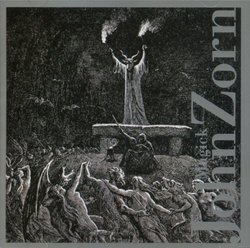| All Artists: John Zorn Title: John Zorn: Magick Members Wishing: 5 Total Copies: 0 Label: Tzadik Release Date: 9/21/2004 Genres: Jazz, Classical Styles: Avant Garde & Free Jazz, Chamber Music, Historical Periods, Classical (c.1770-1830), Modern, 20th, & 21st Century Number of Discs: 1 SwapaCD Credits: 1 UPC: 702397800620 |
Search - John Zorn :: John Zorn: Magick
 | John Zorn John Zorn: Magick Genres: Jazz, Classical
|
Larger Image |
CD DetailsSimilar CDs
|
CD ReviewsMature chamber works from classical musics "enfant terrible" Troy Collins | Lancaster, PA United States | 11/04/2004 (4 out of 5 stars) "Once the enfant terrible of the modern jazz and classical scene in the early 1980's and 1990's, John Zorn is either mellowing with age or following in the footsteps of his forefathers. There was a time when John Zorn was THE genre bashing composer to look to for innovation (from his Naked City thrash jazz punk band to earlier "game-piece" based classical compositions, like Cobra) he now seems to have taken heed of his spiritual forefathers artistic paths. By reaching inward for inspiration rather than attempting to shock the masses, Zorn may have discovered his most personal music. Zorn's interest in Jewish mysticism is nothing new. His various Hassidic based Masada ensembles have been his main focus for the last ten years. They have also become his most accessible and enjoyable projects. This interest has become a primary focus for his recent chamber music writing as well. Everything from solo violin pieces to full orchestral scores have been written and recorded based on such arcane interests. And so this brings us to "Magick." Consisting of only two pieces, it is an enjoyable (if short) excursion into definitive late 20th century classical music. The string quartet piece: "Necronomicon" is stellar, filled with the sort of post-Bartok and Webern stop-start jagged rhythms, trills and glisses that define the modernist aesthetic in post-romantic serialized music. The bass clarinet duet "Sortilege," described as the "most difficult piece written for the instrument" is a challenging and sonically engaging work. While the pieces themselves are enormously captivating, I can't help but wonder what Zorn's current traditional chamber music would sound like if these pieces were written in an earlier phase when he was still sowing the seeds of discontent. Many a classical composer has traveled this path before. Stravinsky, Bartok, Shostakovich, Schoenberg and Webern all went through early experimental phases in the beginning of their careers before settling into a more conservative, neo-classical phase later on. It seems that Zorn isn't quite old enough to be at that point yet, so who knows what the future holds. These works offer some of the finest sounds in the contemporary classical world and we can rejoice in their release. But one sometimes wonders whether adventurousness is being sacrificed for the sake of tradition." Great chamber works. Lord Chimp | Monkey World | 12/29/2004 (5 out of 5 stars) "This disc has two recent chamber works by John Zorn: _Necronomicon_ for string quartet, and _Sortilege_ for two bass clarinets. John Zorn's most recent string quartet _Necronomicon_ presented here, and it is a schizophrenically meditative and brutally frightening. It alternates fast and slow movements. The first, third, and fifth movements are rife with shrieking, dramatic gestures and crunching polytonalities, jarring rhythms, and weblike melodic arrangements. The second and fourth movements are slow and carry a hushed warmth and focus for grasping concepts arcane. It is a mysterious and indelible piece. "Sortilege" is a duet for two bass clarinets. It is an erratic, ever-changing, and considerably more "pleasant" than the quartet, albeit not particularly tonal. While primarily a virtuoso piece, it has its share of affecting expressions." More swell string writing from John Zorn Sparky P. | composer, all around nice guy, yada yada yada | 12/14/2004 (5 out of 5 stars) ""Necronomicon" is John Zorn's fifth recorded string quartet, written in 2003. It is probably his most traditional piece for string quartet, even if he goes to great lengths not to title it as such. But all the traditions are there: with the five movement structure, I cannot help but think Bartók's 4th and 5th quartets (and, by listening to it and becoming more familiar, Ligeti's 2nd as well, which is also in five movements), especially with the symmetrical arch structure, with the fast third movement surrounded by two slow movements, which are framed by two outer faster movements. There is just a fair amount of his typical "scratchy-scratch" string writing, mostly found in the outer movements. There is also not as much "jump cutting material" as in some of his other quartets, especially "Cat o' Nine Tails" and "Dead Man"; in fact, the material is more akin to Zorn's "Kol Nidre": single subjects, well developed. The fourth movement has almost a melody with simple chordal accompaniment, almost alien for Zorn's writing it seems like.
The other piece is "Sortiége", scored for two bass clarinets. This is more like the Zorn of yorn, with the skittish angular figures and the jump-cutting of one kind of material to another and another in a matter of seconds. Definitely not something for amateurs to try at home." |

 Track Listings (6) - Disc #1
Track Listings (6) - Disc #1